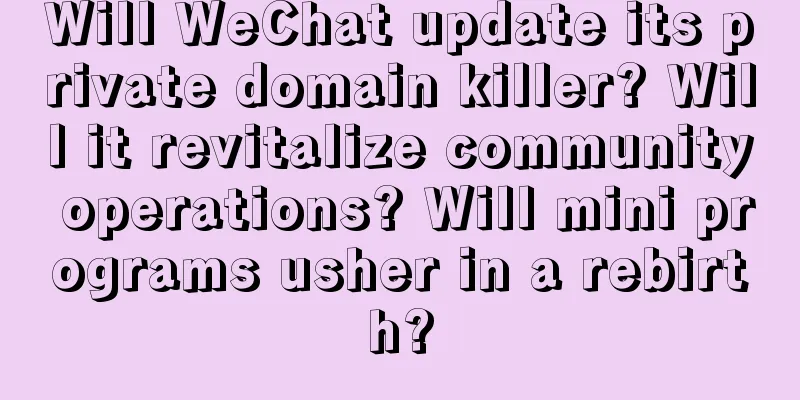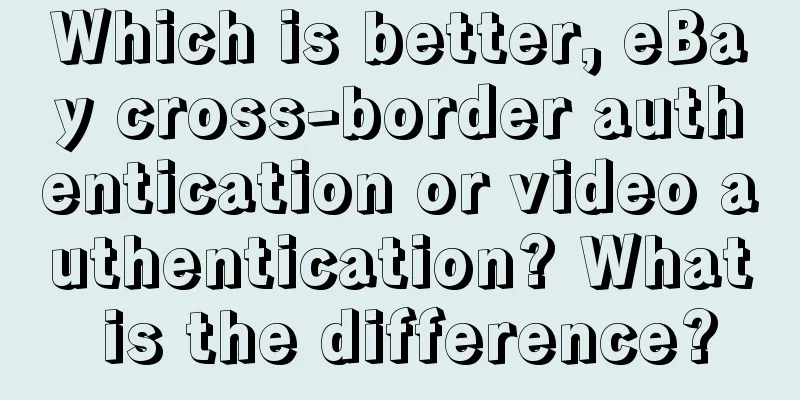Family members! Who knows! Can private domain traffic be done this way?

In the previous articles of the official account, 58 Recruitment analyzed and summarized the vertical private domain design methods. 1. IntroductionFirst of all, let me introduce that 58 Local is a life information platform that establishes a link between vertical businesses and users through life information content. As public domain traffic has peaked, local areas have also joined the private domain and started looking for private domain traffic incisions suitable for their own development. This article will show you from another perspective how to build private domain scenarios such as vertical businesses, life content information, etc. with different user attributes. The local private domain design panorama includes four main key parts: private domain brand design, private domain traffic, private domain operation, and business conversion, which will be introduced in detail below. 2. Private Domain Brand DesignThe advantage of private domain scenarios is that it is easier to establish trust with users, so the brand tone will affect the effect of subsequent links with users. Therefore, in private domain brand design, more attention will be paid to the value between people. 58 Local’s public domain traffic channels are relatively complex, with the APP accounting for the largest proportion, followed by mini programs, public accounts, etc. If there is no perfect brand relationship, users will easily get lost after entering the private domain scene. Therefore, building a private domain brand will be the beginning of private domain design. 1. Private domain brand establishmentAs the brand tone and value of public domain platforms continue to improve, users have also accumulated a certain impression of the brand. Therefore, effectively utilizing the existing brand value to extend it can not only reduce users' cognitive costs for new things, but also make it easier for users to establish a relationship between the private domain and the public domain. Compared with public domain brands, private domain brand design will be more in line with the display rules on WeChat, avoiding problems such as content being cut off after a rectangle is transformed into a circle. 2. Brand emotionalization(1) Closer distance with users It is easier to get along with users in private domain scenarios. A message push mechanism is established through the local public account matrix to provide 26 types of life content information related to users, including education, welfare, real estate, etc., cutting into the real life of users and combining light-hearted and pleasant color matching to incorporate the atmosphere of the market, thereby enhancing the brand temperature and narrowing the distance between users. (2) Empathize with users At the same time, establish brand personality, combine virtual characters such as WeChat assistants to connect with users, use WeChat chat scenarios to communicate with users, and enhance trust between platforms. 2. Public domain brand designTraffic generation is the core of public domain design. The main pain point is how to convey private domain brands to users. Different private domain brand visions are established based on the scenarios of users' browsing needs in the public domain. (1) Business requirements Taking users with recruitment business needs as an example, visual elements such as job application cards and work cards are used to create a vertical brand with strong business scenario attributes for job seekers. (2) Non-business needs For users without business needs, their goals are broader and they may have many needs such as level growth, social interaction, etc. Therefore, it is necessary to focus on their needs through some general guidance, use universal elements such as gold coins and red envelopes, and establish non-business scenario brands. 3. Private Domain TrafficThe effect of the drainage entrance determines the difficulty of subsequent operations. Some users successfully enter the private domain traffic pool but are not active, and the operation is almost ineffective. Although such users have an increase in private domain data, they are of no value at all. To this end, we should first clarify the core issues of establishing private domain scenarios: what kind of users are needed? What are the needs of these users? Due to the local platform attributes, user demands in public domain traffic are mainly divided into two categories: one is users with business needs, and the other is users with life information content needs. 1. Business demand usersAccording to the current business demand status of users, further granular analysis revealed that some users currently have clear business needs, while others have potential business needs. Therefore, different traffic diversion methods are used based on the two different demand states of users. (1) Have target users For users who currently have clear business needs, they will be directly directed through business lists and detail pages. For specific analysis and explanation, you can still learn more professional design methods in the "Private Domain Design Guide". (2) Potential target users It’s not that potential users don’t have business needs, but that they don’t have enough motivation to stimulate current needs, or they need to learn and understand relevant business information before being guided to make clear business decisions. Therefore, professional business content is needed to attract traffic. Taking real estate business traffic as an example, for users who have no experience in buying a house, industry content such as home buying guides and real estate market analysis will be easier to obtain the possibility of directing traffic to private domain scenarios than directly sending housing information. 2. Users without business needsThe goals of users without business needs are relatively scattered. Blindly directing them to private domain scenarios will not work. Therefore, it is necessary to combine the value generated by users on public domain platforms and reasonably screen out users who are effective for private domain scenarios. Most users without business needs will eventually settle in three directions by consuming information content on public platforms. One type of users will generate business demands during the content consumption process and gradually transform into business demand users. The other type will always consume content and will not undergo any form of change during its life cycle. The actual value generated by single content consumption is relatively weak and is not suitable for introduction into private scenarios. The last type of users, although they fail to generate business needs, will complete many valuable actions such as sharing, posting, and commenting in combination with the tasks set by the platform as their needs for honor, participation, and mutual assistance increase. They have higher user driving force and are suitable for introduction into private domain scenarios. (1) Attracting top users However, not all users who can cooperate with the platform to complete tasks are the targets of private domain scenarios. Instead, more qualified top users need to be pulled into private domain scenarios. Therefore, level screening is used to target mid- and high-value users. 4. Community OperationIt is easy to attract traffic but difficult to operate. Although through precise traffic diversion in the early stage, it is possible to initially establish private communities for users with different attributes, it is more important to use the existing advantages through continuous and high-frequency refined operations to create a high-quality and active private traffic pool. Of course, to avoid becoming "invalid private domain traffic", active, continuous and interactive operations are essential. 1. ActivityEffective activity is an important criterion for identifying the value of a community. However, in private domain operations, people are often eager to pursue high activity and fall into misunderstandings about improvement. They use red envelopes, advertisements and other methods to break the ice. However, the increased invalid chats will not have any driving effect on conversions. Operational content that targets community goals, whether it is business conversion or content production, as long as it is aimed at solving user needs, can make users become active in the process of meeting their needs, trigger interactive behaviors in the community, and thus drive more users to form effective activity. There are three operational sources for effectively improving activity: lightweight, high frequency, and multi-dimensional, taking business community operations as an example. (1) Lightweight Avoid the appearance of business cards on the APP list page, completely adopt lightweight WeChat operation, and combine text messages, mini-programs and other methods to reduce user bounces, allowing users to browse easily in private domain scenarios. (2) High frequency Information content is delivered to users at a high frequency and regularly through daily and weekly updates. (3) Multi-dimensional According to the different needs of users, we push different positions, regional dimensions, single positions, position collections and other content with different granularity to attract user attention and increase activity. 2. Continuous contentFrom the perspective of long-term community operation planning, establishing continuous content that is in line with future development can further improve the user retention rate in the community. At the same time, diverse outputs are also needed in form, such as launching regular live sharing, series of courses, and various continuous material content to increase community value and expectations. For example, some long content can be displayed in installments, with the theme and content of each installment being continuous, allowing users to form a subtle habit of regular browsing. 3. Participate in the interactionIn the process of community operation, in addition to the core content, some other operational activities will be carried out to enhance the interaction within the community. There are many forms of community interaction. Some common interactions include fission, invitation, question and answer, chain, check-in... 5. Business TransformationVertical businesses can go deeper into the industry for industrialization, and their conversion capabilities are stronger than non-vertical businesses. Therefore, 58 Local is still in the trial stage for business conversion, building business conversion in several scenarios such as assistant 1V1, WeChat groups, official accounts, Moments and mini programs. The three categories of assistant 1V1, WeChat groups, and public accounts have been introduced in the article, so I will not go into details. Next, I will mainly introduce the following new attempts in the circle of friends and mini program scenarios. 1. MomentsAs a core touchpoint in business conversion, the operation of Moments can not only avoid the problem that users cannot receive the operation content after folding the group message, but also avoid the problems of daily message restrictions and operation costs of public accounts. At the same time, with the opening of the WeChat ecosystem, it is easier to use Moments for business conversion. Therefore, we try to use Moments for business conversion, link the mini program to realize the ordering of 58 home delivery service in Moments, complete the business conversion action and realize the business closed loop. Of course, the operation process of the circle of friends also needs to pay attention to the following three points:
2. Mini ProgramsAs the core of the connection between private domain and business, the mini program's empowerment of business conversion is obvious. With its own light weight advantage, the efficiency of the connection between traditional APP users and business is significantly improved compared with traditional APP. At the same time, as a landing platform, the mini program has taken over the underlying operational functions of a large category. By integrating fragmented scenarios, the mini program has also achieved the ultimate value of promoting private domain traffic. VI. ConclusionNo matter when, "private domain traffic" should be done as early as possible. As the traffic dividend gradually declines, the cost of adding new users will become higher and higher. Therefore, serving existing users well and tapping more value are the core issues in solving business growth. The real core value of private domain lies in people. In public domain scenarios, users have a life cycle. However, after entering the private domain community, user retention will be calculated in years, and the trust generated through long-term operation will be greater. Since the explosive growth of private domains in 2019, several iterations have taken place. From changes in models to upgrades in operating methods, private domain scenarios are also constantly exploring new scenarios. Author: Lu Zhihong Source public account: 58UXD (ID: i58UXD), 58UXD, full name 58.com User Experience Design Center. |
>>: How to create a brand identity that is deeply rooted in people’s hearts?
Recommend
Can Amazon Video Certification be used as an alternative? How to prepare?
In Amazon, people usually go for video authenticat...
Why do people need village night
Recently, topics related to the Spring Festival Ga...
Alibaba's ChatGPT "Tongyi Qianwen" is officially announced! Tmall Genie and DingTalk's new features are revealed
At the 2023 Alibaba Cloud Summit, Zhou Jingren, CT...
Public account articles now support modifying cover images!
Now, official account articles can modify the cove...
How did this analyst go from making decisions based on intuition to supporting them with data?
Why can analysts make data-supported decisions? Th...
New consumption has lowered its profile, and popular brands are moving towards high-end?
With the changes in the current consumer environme...
There are two TikTok celebrities with a million in revenue, one harvests his father, the other harvests his mother
The celebrities in the field of entertainment on D...
Is it difficult to ship on Amazon? How to choose products?
Many friends on Amazon did not choose to cooperate...
A new MVP emerges in the 40 billion short drama market
As AI technology continues to deepen in the field ...
5 marketing common senses that most business owners and CMOs tend to overlook!
How to understand the polarization of consumption ...
[Revealing] How do top bosses attract fans with their personal stories?
We often see some top bosses share some exciting a...
Video platforms compete with the Olympic economy, who can catch this "sky-breaking wealth"?
With the arrival of the 2024 Paris Olympics, the b...
Writing with ChatGPT, four levels of prompt words
In this article, the author shares his own rules o...
How many orders are normal on eBay per day? How can I increase my store sales on eBay?
eBay is an excellent cross-border e-commerce platf...
Brand setting | Personality setting makes the brand three-dimensional, interesting and vivid
In today's era, whether it is a star, a person...









